PPC history might not be the sexiest subject on the interweb, but the history of advertising is probably a good one to explore when trying to forecast the future of PPC.
So much went down before Google became the number one most popular online giant that it is today.
Reading through PPC ad history might be helpful in steering online marketers toward a progressive more competitive direction (always the goal, right?).
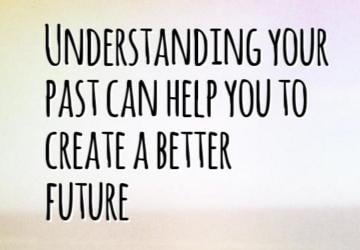
As we continue to advertise and put ourselves out there online (exploiting our hard-earned brands using our best BS&T), do we need to incorporate PPC as heavily and how intense should it be?
Before doing my own research, I didn’t think I’d have to go as far back as I did - 1996!
That’s before I graduated high school; when the Bayside High cool and nerdy (pre-hipster) kids were featured on reruns every weekday.

AIM was a thing and hooking up to “hello, you’ve got mail” was enough of a challenge, let alone keeping track of web crawlers and paid vs. organic search results.
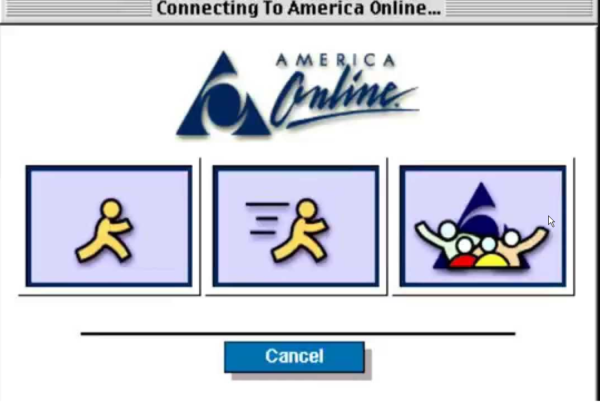
Regardless, the late ‘90s zone is where I found the history of PPC content (or birth and life of PPC) to start, so here it is:
Get brand new PPC strategies straight to your inbox every week. 23,739 people already are!
1996
Apparently, the first documented PPC advertising spaces were launched on a web directory called Planet Oasis (on a desktop of course).
Open Text Index starts selling PPC ads in their search results – this was highly unpopular and not a greatest hit. Their Preferred Listings was not so preferred (evidence in email trail form).
Stanford University starts a research project; a much better little thang called Google. More specifically, engineering students Sergey Brin and Larry Page created the first Google server at their Stanford School of Engineering.
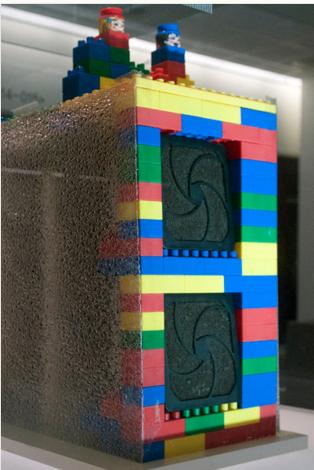
Yahoo! hits the public stock market with a launched IPO valuing at $334 million.
1997
Boom! More than 400 major brands actively use PPC advertising in search results and directories. The noted cost for PPC ads at this time are $0.005-$.025 per click.
Bummer! Both AltaVista and Yahoo! turned down an offer to buy Google for $1 million from Sergey Brin and Larry Page. The two engineers basically wanted to resume their studies at Stanford.
Later on, Page and Brin patent PageRank system, which represents the core of Google.
1998
The year started off with advertisers already adapting to the bidding platform. GoTo.com established the PPC auction system, and by mid-year, advertisers are paying up to $1 per click.
1999
GoTo.com launches a tool set providing advertisers with fancy real-time pay-per-click bid amounts on specific keywords.
2000
I do remember the Y2K fright so this makes sense: the online advertising market crashes alongside the dot com bubble burst.
Many businesses go bankrupt and advertisers are wary of paying for their clicks – abort!
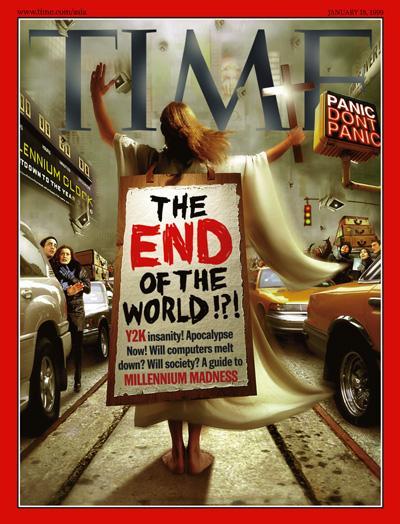
Google, being the badass that it is, launches a self-serve platform allowing advertisers to place ads on selected keywords.
AdWords is introduced to the market with a flat CPM bidding model where advertisers pay up when their ad is shown (made sense even back then!)
2001
GoTo.com rebrands and freshens up with a new name, Overture Services, as well as new partners, Yahoo!, MSN and a slew of other search engines.
Overture Services earns $288 million in pay-per-click ad revenue.
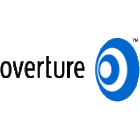
Google earns $85 million in pay-per-impression ad revenue.
2002
Google AdWords introduces a new PPC ad model giving their advertisers the option to use relevance for ranking (and the click-through-rate stuff we care about today!).
This, of course, maximizes revenue and the search experience.
Shopping.com provides ecommerce sites the ability to bid per click, which gives products the chance to be featured higher in the price comparison. This becomes a trend in the space and other similar shopping sites do the same.
Remember when Yahoo! turned down the $1 million price offering to purchase Google?
They revisited negotiations and turned down a $5 billion offer (very unfortunate as the current market capitalization is over $500 billion).
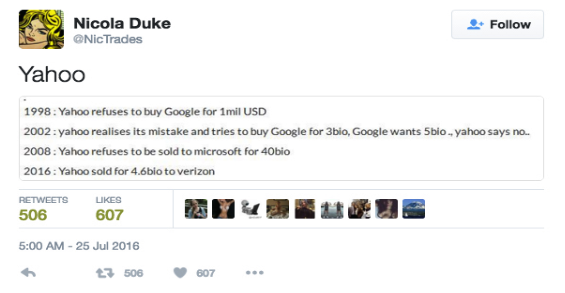
2003
In the summer, Yahoo! acquires Overture Services for $1.63 billion in stock and cash. Yahoo! is stepping it up!
According to the Wall Street Journal, Jennifer Kohl, executive director of media for Brand Buzz, an integrated-marketing division of WPP Group PLC's Young & Rubicam, endorsed the approach.
"From an advertising standpoint, any time you can get more to that exact person who wants to know about SUVs and the color black - if I can bid on that and get an efficient cost per click, why the heck not?"
she said.
And Google is keeping up. Google acquires Applied Semantics and launches Adsense.
Content publishers are now able to serve PPC advertising to targeted audiences.
2004
Google is on the rise. Its search market share reaches a peak of 84.7% of all web searches, and the company goes public with an IPO priced at $85 a share.
You know…close to $24 billion, no big (at this time, Yahoo! has a market value of $39 billion).
2005
Google runs into a glitch and acknowledges the problem with click fraud in its PPC network. To resolve the issue and prevent click fraud from occurring, Google implements preventative measures.
Google Analytics is released into the market and advertisers now have the ability to track and measure their ad campaign performance.
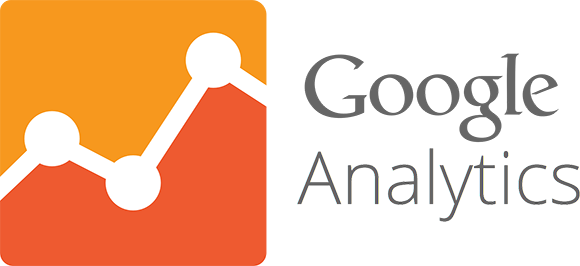
Meanwhile, Google AdSense generates $799 million in revenue for Q4, which makes up 42% of Google’s revenue.
2006
Microsoft severs ties with Overture Services as its search ad provider and, instead, announces adCenter, its own self-service PPC ad platform.
Facebook partners with Microsoft adCenter and launches advertising on its site, in the form of banners and sponsored links.
Oh that social media! At the time, they were trying to capture the younger adult demographic.
Aaron Cohen, CEO of Bolt Media, said the Facebook partnership was going to help Microsoft’s search engine penetrate those under 30, a demographic they were struggling with.
Google acquires YouTube, the world’s largest online video website, for a mere $1.65 billion. At the time, YouTube was the third largest search engine (now being the second largest).
2007
Facebook gets way into it. The social media giant launches its own advertising platform, providing advertisers the chance to target FB users by demographics and interests (score!).
PPC bidding is automated as bid management software solutions (like Marin Software) are launched.
Fetchback and Criteo launch remarketing, something that used to be oh-so-creepy! Advertisers can now reach the people that have previously been to their website.
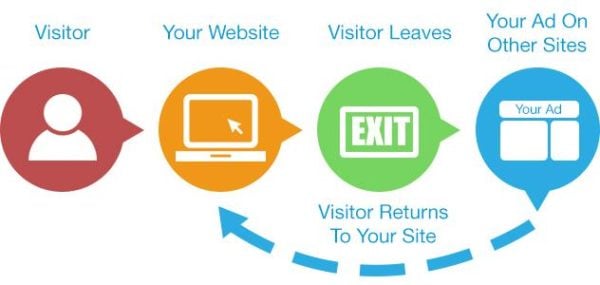
2008
Google worked on its relevance score (aka quality score), once again maximizing revenue and the search experience as it did in 2002.
Several PPC networks start up, such as Shopping Comparison networks.
LinkedIn makes the classic social media move and launches DirectAds, a platform that gives advertisers the opportunity to target LinkedIn users by demographics, industry or job title.

In its July 15 blog, LinkedIn encouraged advertisers to participate in DirectAds’ offerings –
“Like existing ads on our site today, DirectAds advertisements are intended to be non-obtrusive messages that accompany the overall experience of LinkedIn.
Note that you won't see any additional ads with the introduction of this product and every DirectAds ad includes the advertising member's name and profile data, so you'll know who is trying to reach members like you.”
2009
Market behaviors move the players into the mobile space. The major PPC networks focus on mobile ad solutions with Google.
Google acquires AdMob, a mobile ad startup, for $750 million.
2010
Trying to compete with Google’s increasing market share, Microsoft search re-launches as Bing and partners with Yahoo! to syndicate their ads on the Yahoo network.
The deal that started convos in 2008 was solidified and cleared by February of 2010.
Yahoo’s CEO in 2008, Jerry Yang, said “Yahoo! was open to a new offer from Microsoft.”
Under new 2009 CEO, Carol Bartz, the idea of acquisition was replaced with a deal where Yahoo! gave up its search technology in exchange for listings and ads from Microsoft’s Bing search engine, with Yahoo! gaining a big cut of any ad sales.
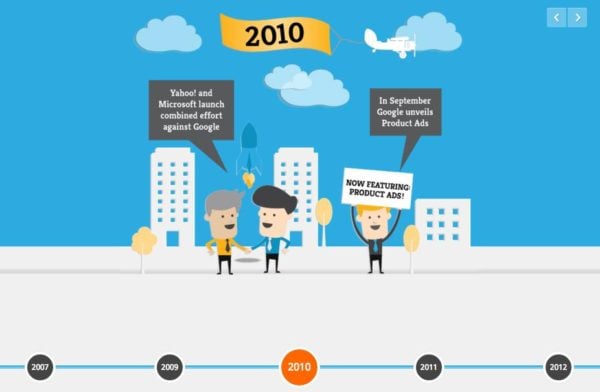
Google AdWords remains competitive and adds new products, to include Product Listing Ads and straight up remarketing.
Companies like CPC Strategy and people like Jason Bell provide guidance in navigating Google’s Shopping and Product Listings Ads, which show up on the top left of results pages.
PPC platforms, such as Outbrain and Taboola, grow in popularity for news outlets and publishers, which means content marketing is a thing.
2011
Cost-per-click ads are super popular on all networks. Fun fact: most popular keywords are “loans” averaging $44.28 per click and “insurance” averaging $54.91 per click in the US.
Oh-that-Facebook launches Sponsored Stories, which pulls FB users’ images and names to promote advertisers posts to their friends.
This was denied – there was a lawsuit so the option was removed (and maybe it was a little too creepy).
According to a Forbes article, “the outcry over Sponsored Stories shows the fine line between collecting user information and sharing that information in a way that connects the user to it.”
Retargeting becomes quite popular as found in this 2013 Marketing Charts data, where customers are actually stating that they prefer targeted ads over random ones.
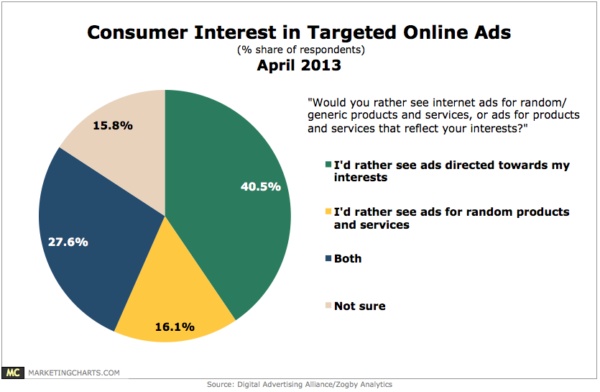
2012
Twitter releases its self-service ad platform for US advertisers to start.
Google hits a monumental moment in its history and surpasses $50 billion in revenue for the first time, 95% of which came from the advertising stream.
Smartphone devices are 25% of all paid search ad clicks in Google’s network.
2013
Google launches Enhanced Campaigns, which limits the ability to turn off certain devices.
Facebook launches its own remarketing solution that can be attached to mobile apps or websites.
PPC options for ecommerce sites, such as PCG Digital, increase with Dynamic Remarketing, which is the ability to remarket similar products to what the user has just viewed (new level of creepy!).
2014
Google launches the ability to track phone calls directly from ads and from websites, which provides better optimizations of ads and keywords.
PPC ad costs rise and conversion rate optimization (CRO) becomes more popular. Advertisers jump on the landing page bandwagon to maximize performance.
PPC ad spend continues to grow with mobile spend up to 98% YoY.
Social media ad revenue is definitely growing, however ad revenues remain king on Google.
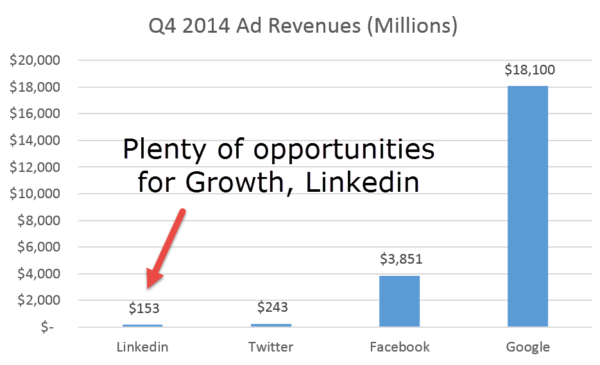
Larry Kim posted a blog about eight areas of much-needed improvement on LinkedIn’s ad options.
Remarketing remains an important tactic.
Sarah Stemen of PPC Hero predicts Remarketing Lists for Search Ads (RLSA) will lead to a more persona-based approach.
2015
Remember Stanford engineers Sergey Brin and Larry Page? They found Alphabet Inc. in October.
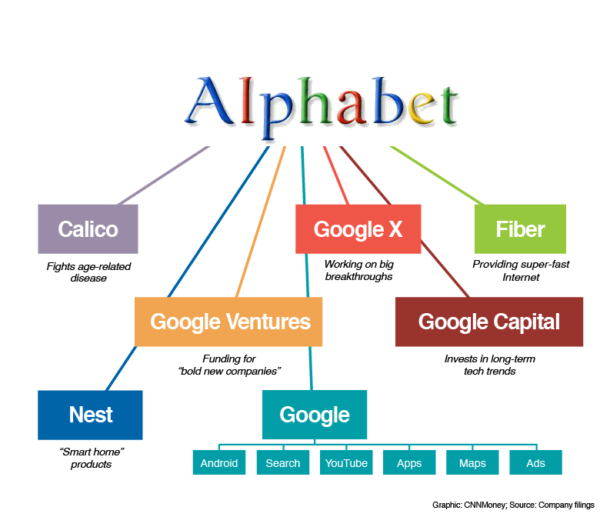
The American multinational conglomerate founded by the two Google co-founders exists with Page serving as CEO and Brin as President.
From a business empire standpoint, they are sitting pretty.
Google integrates TrueView video campaigns in AdWords.
Things are looking more social media and more mobile display oriented – how does Facebook compete with Google?
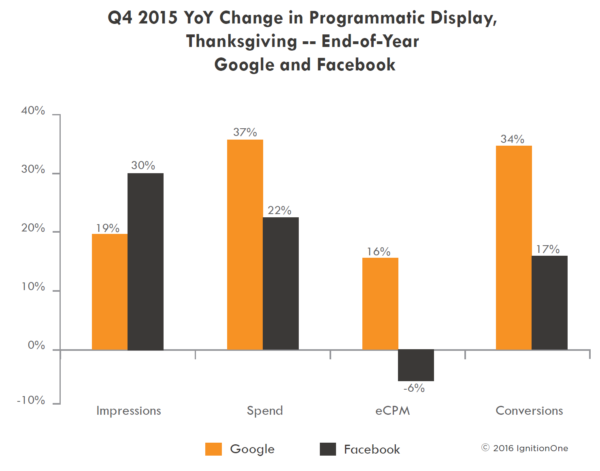
2016
Digital display ad spending surpasses search ad spending in January of this year.
Combined, the categories of video, sponsorships, rich media and “banners and other” will account for the largest share of digital ad spending: 47.9%, worth $32.17 billion.

eMarketer projects that rich media spending will grow by 36.4% and video stream ad spend will grow by 28.5%.
The Future of Pay-Per-Click Advertising
What are the influencers and experts predicting? Nine insights below:
1) Social Media
Gabriel Shaoolian of Blue Fountain Media projects social platforms will continue to develop their ad products more extensively in the future, presenting new challenges.
2) Affiliate Marketing
Decca Journal claims Affiliate Marketing (broken down by CJ Affiliate by Conversant) to continue as king in the foreseeable future, pushing PPC off as having “almost no role in direct referral marketing between individual websites.”
3) CPA
Chief Content Officer Allan Campbell at Executive Digital believes in cost per action (CPA) and claims the future consists of advertisers that want to pay per action that occurs once the consumer clicks on their site: forum sign-up, sale opt-in, newsletter subscribe, etc.
4) PPC & SEO Combo
Melissa Duko, Editor and Content Writer for eZanga determined from a Google Research case study that 89% of ad traffic is up for grabs.
She advises advertisers take advantage and
“grab that traffic by using both PPC and SEO. Companies will use both to increase digital visibility; thus, maximizing their brand exposure and producing higher conversion rates.”
5) Mobile
Larry Kim projects on NayouQuan Online the mobile search explosion and bases his forecast on the 175% increase in the number of shopping-related searches made via mobile devices the year leading up to June of 2015.
eMarketer projects,
“of the $22.58 billion that will go to banners, rich media, sponsorships and other display-based formats in the US this year, 77.5%, or $17.5 billion, will be spent to reach individuals on mobile devices like smartphones and tablets.”
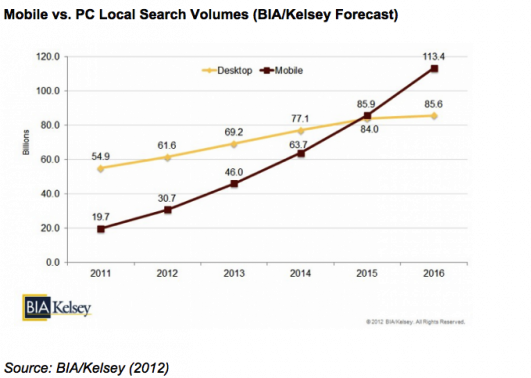
6) Even BING
David Szetela, CEO and Owner of FMB Media, says Bing Ads search and display traffic will finally be viewed as “must have” by a growing number of advertisers.
“This will be driven by the fact that the increasing click inventory will continue to be priced below Google CPCs.”
Further, Marc Poirier predicts Google’s share of search in the U.S. as measured by comScore
“will drop below 60 percent in 2016 as a result of Bing’s rapid growth following the acceleration of the deployment of Windows 10 with Bing globally.”
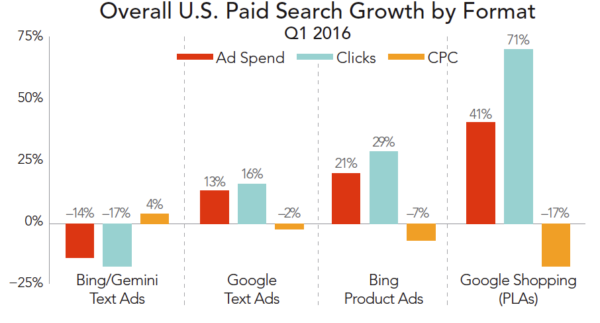
7) Data Analytics
Bid management, big analytics and data warehousing will all continue to play an integral role in the life of PPC.
According to an article supplied by Carcoco Marketing on Inbound Marketing Agency, Click Finders,
“Bid management tools will become more intelligent, as will the algorithms governing search rankings and ad placement.
As we move closer and closer towards ‘big analytics’ and data warehousing, today’s PPC managers and executives are well-positioned to be the stars of the future.”
8) Remarketing
It will still be a thing and likely expand.
eZanga’s Melissa Duko writes, “thanks to Facebook’s Atlas platform, cross-device advertising will deliver ads to any device that you use to log into Facebook.”
What this means: the ads you see will be tailored to your Facebook profile (even more!).
This is a big opportunity because, apparently before Atlas, advertisers relied on cookies, which, according to AdAge’s Don Mathis, only had a 59% tracking success rate and failed to connect users across various devices.
Pauline Jakober of Group Twenty Seven touts on Search Engine Land the significance of RLSAs.
9) Video
According to an eMarketer article:
"Desktop will remain the biggest beneficiary of US digital video ad dollars in 2016, garnering 57.5% of an expected $9.59 billion in spending.
This vibrant market in which consumer-led media habits (particularly increases in video consumption and mobile device usage) is funneling display ad dollars to the most desired channels and formats."
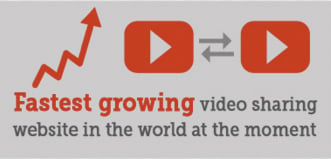
So the world of PPC advertising didn’t and won’t always look like this:
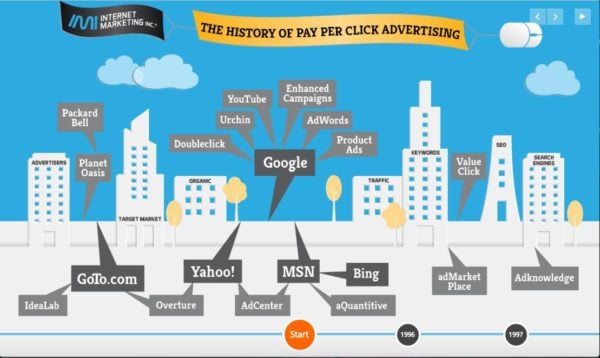
With all the nine above-mentioned popular options, looks like PPC is here to stay.
Choose wisely and be ready for the new trending formats and ever-changing algorithms so you know where to put your bids.
The brands you represent will appreciate you!